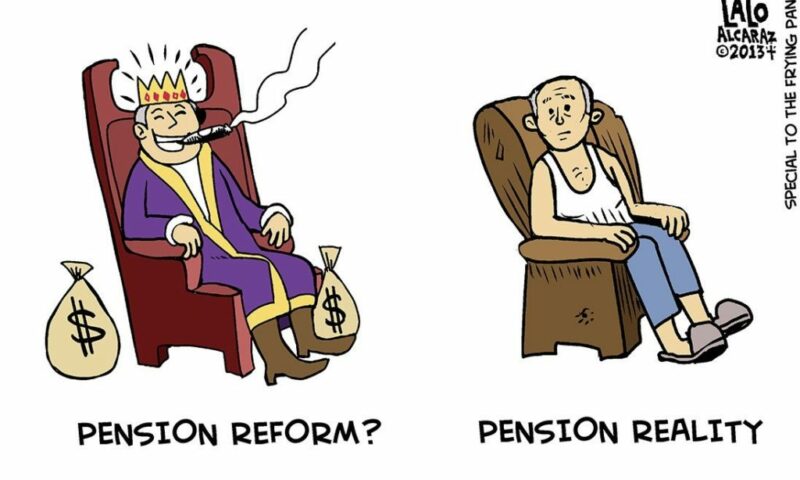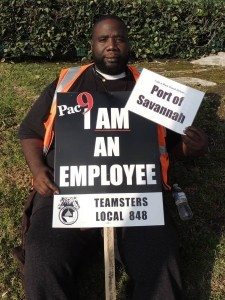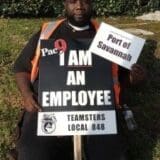

It’s official: America has entered a retirement crisis. Or, as Forbes understatedly put it, “the greatest retirement crisis in the history of the world.”
And, while the causes are manifold — the demographic bulge of baby boomers leaving the fulltime workforce; greater worker longevity; the disastrous, 30-year shift from traditional defined benefit pensions to costly 401(k)-style plans — most experts agree that the national retirement implosion has gone critical, with an estimated 75 percent of Americans who are nearing retirement age having less than $27,000 in their retirement accounts.
Even John C. Bogle, the founder of the $2 trillion mutual fund and 401(k) behemoth Vanguard Group, recently admitted that the system of retirement plans that rely on 401(k)s is broken.
“[401(k)s were] designed as a thrift plan, and it doesn’t work as a retirement plan,” Bogle declared.
So it is with some irony that a Texas hedge fund billionaire/former Enron trader and a politically ambitious Northern California mayor have teamed up to cripple one of the few parts of the retirement story that still works — California’s public-sector pension system.
» Read more about: My Body Isn’t 40 Anymore: Three Faces of Retirement »


 This afternoon about 100 port drivers will return to their jobs after staging a 36-hour walkout. The unfair labor practices strike, which was supported by the International Brotherhood of Teamsters Local 848, was called to protest what drivers say is employer retaliation for trying to organize a union. The companies targeted in and around Carson were Green Fleet Systems, Pac 9 Transportation and American Logistics International. The drivers claim they’ve been intimidated and harassed for their organizing efforts – employer actions that are against U.S. labor law.
This afternoon about 100 port drivers will return to their jobs after staging a 36-hour walkout. The unfair labor practices strike, which was supported by the International Brotherhood of Teamsters Local 848, was called to protest what drivers say is employer retaliation for trying to organize a union. The companies targeted in and around Carson were Green Fleet Systems, Pac 9 Transportation and American Logistics International. The drivers claim they’ve been intimidated and harassed for their organizing efforts – employer actions that are against U.S. labor law.
In addition to the retaliation allegations lodged with the National Labor Relations Board, wage-theft charges have been filed with the state against Pac 9 for misclassifying its employee drivers as “independent contractors” – a ploy that has allegedly allowed the company to deduct its business expenses from the drivers’ salaries.
The striking port drivers did not walk the line alone – Teamsters from the Toll Group,
» Read more about: Port Truckers Strike to End This Afternoon »


Walmart just reported shrinking sales for a third straight quarter. What’s going on? Explained William S. Simon, the CEO of Walmart, referring to the company’s customers, “their income is going down while food costs are not. Gas and energy prices, while they’re abating, I think they’re still eating up a big piece of the customer’s budget.”
Walmart’s CEO gets it. Most of Walmart’s customers are still in the Great Recession, grappling with stagnant or declining pay. So, naturally, Walmart’s sales are dropping.
But what Walmart’s CEO doesn’t get is that a large portion of Walmart’s customers are lower-wage workers who are working at places like … Walmart. And Walmart, not incidentally, refuses to raise its median wage (including its army of part-timers) of $8.80 an hour.
Walmart isn’t your average mom-and-pop operation. It’s the largest employer in America. As such, it’s the trendsetter for millions of other employers of low-wage workers.
Last week’s Twitter IPO triggered stories about “tech culture’s” impact on San Francisco and the broader society. It made me ask: is there really a culture of tech outside the workplace and, if so, what is it? More importantly, does labeling popular activities among young workers as “tech culture” create divisions among people who otherwise could be working together to solve social problems? Many (including myself) have identified the term with a libertarian political philosophy, hostility to unions and overwhelming white and Asian-American workers under-40 without kids. It is also identified with the rise of artisan coffees and foods, wine bars, upscale restaurants and the now legendary $4 toast that led the Courage Campaign to launch a petition to Mayor Lee regarding the city’s rising costs.
But associating “tech culture” with the politics of the tech elite, as occurred after Facebook’s Mark Zuckerberg’s founded a pro-immigration reform group that ran opportunistic ads supporting the Keystone XL Pipeline and drilling in the Arctic National Wildlife Refuge,


(Randy Shaw is the editor of BeyondChron and author of The Activist’s Handbook, Second Edition. This post first appeared November 14 on BeyondChron and is republished with permission.)
 Last week’s Twitter IPO triggered stories about “tech culture’s” impact on San Francisco and the broader society. It made me ask: is there really a culture of tech outside the workplace and, if so, what is it? More importantly, does labeling popular activities among young workers as “tech culture” create divisions among people who otherwise could be working together to solve social problems? Many (including myself) have identified the term with a libertarian political philosophy, hostility to unions and overwhelming white and Asian-American workers under-40 without kids. It is also identified with the rise of artisan coffees and foods, wine bars, upscale restaurants and the now legendary $4 toast that led the Courage Campaign to launch a petition to Mayor Lee regarding the city’s rising costs.
Last week’s Twitter IPO triggered stories about “tech culture’s” impact on San Francisco and the broader society. It made me ask: is there really a culture of tech outside the workplace and, if so, what is it? More importantly, does labeling popular activities among young workers as “tech culture” create divisions among people who otherwise could be working together to solve social problems? Many (including myself) have identified the term with a libertarian political philosophy, hostility to unions and overwhelming white and Asian-American workers under-40 without kids. It is also identified with the rise of artisan coffees and foods, wine bars, upscale restaurants and the now legendary $4 toast that led the Courage Campaign to launch a petition to Mayor Lee regarding the city’s rising costs.


Author and documentary film co-producer (Wal-Mart: The High Cost of Low Price, Iraq for Sale) Kerry Candaele’s newest work records the transformative power that Ludwig van Beethoven’s Ninth Symphony has had upon the lives of four people. These stories took him to a dozen countries on five continents, part of a journey of discovery about one of music’s greatest achievements. In Candaele’s new documentary, Following the Ninth: In the Footsteps of Beethoven’s Final Symphony, the Ninth’s “Ode to Joy” choral finale emerges as a soundtrack for social justice and world brotherhood.
In this film, which Bill Moyers calls “beautiful and powerful,” Candaele recounts the struggles of rebellious students like Feng Congde at Tiananmen Square, who played the “Ode to Joy” over loudspeakers as they faced the tanks,
» Read more about: Interview With the Director of ‘Following the Ninth’ »
For generations, Americans have relied on public service workers to inspect the food we eat. In fact, one major concern of the recent government shutdown was that food inspectors would be furloughed, endangering or shutting down the food supply chain across the country.
American public institutions have a long track record of keeping our food disease-free. Yet as this service is increasingly outsourced to for-profit corporations, it is leading to repeated oversight failures that have caused illness and even death. And too often, the for-profit entities that are now responsible for keeping our food safe have conflicts of interest that encourage them to rubber-stamp inspections rather than ensure our food is safe.
The Department of Agriculture’s Food Safety Inspection Service (FSIS) has proposed a “Modernization of Poultry Inspection.” But “modernization” is just public relations babble for removing USDA inspectors from poultry lines and letting companies police themselves.
» Read more about: Removing USDA Poultry Inspectors: What Does the Fox Say? »


Twenty-seven port truck drivers walked into the Rancho Dominguez offices of Total Transportation Services, Inc. (TTSI) Thursday and presented their employer with a petition. Their demand was simple: to be properly recognized as employees. TTSI is one of the largest port trucking companies in the twin ports of Los Angeles and Long Beach. TTSI’s business model – like the vast majority of port trucking companies in the country – relies on misclassifying its drivers as independent contractors.
When companies like TTSI misclassify their employees, they not only deprive the public of much-needed revenue by avoiding taxes, they also deprive workers of hard-earned wages by deducting business expenses like lease payments and fuel from drivers’ paychecks.
As TTSI driver Jose Rosales states, “Some weeks we aren’t even breaking even. How can I build a future for my family this way?”
Rosales and his fellow TTSI drivers who delivered yesterday’s petition are also seeking recourse through the California Division of Labor Standards Enforcement (DLSE),
» Read more about: TTSI’s Port Drivers Demand to Be Treated as Employees »


On December 5, as part of its 20th anniversary celebration, the L.A. Alliance for a New Economy will honor OUR Walmart, an organization determined to transform conditions at the world’s largest retailer. Frying Pan News recently asked Walmart employee Martha Sellers, who has worked at the company’s Paramount store for 10 years, to reflect on her role in one of the most ambitious social justice efforts of our time.
Frying Pan News: If you could sit down for a one-on-one conversation with Walmart CEO Mike Duke, what would you say?
Martha Sellers: Explain to me why you cannot afford to pay us a living wage when it is proven you make mega bucks. Why?
You spend your money on all these things but your associates. Why?
You spend money on PR and opening more stores when the stores that are already open are not doing well.
» Read more about: Fear Is No Option: Walmart Associate Martha Sellers »


This morning L.A. Observed disclosed the death of its business editor and writer, Mark Lacter. LAO editor-in-chief Kevin Roderick reported that Lacter’s “wife, the author Laura Levine, told me that Mark suffered a stroke yesterday and could not survive the bleeding on his brain. He was 59 and died at Ronald Reagan UCLA Medical Center.”
A former Los Angeles Business Journal editor, Lacter was a regular commentator on radio station KPCC and also published in Los Angeles magazine. In 2005, he was named by the Society of Professional Journalists as Distinguished Journalist of the Year
Although Lacter would often infuriate Frying Pan News readers with his swipes at unions, he also railed against developers who were manipulating the government’s EB-5 visa program and, more notably, against the outlandish inequality between Los Angeles’ haves and have-nots.